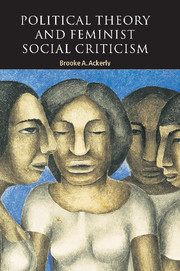Book contents
- Frontmatter
- Contents
- Acknowledgements
- 1 Silent voices and everyday critics: problems in political theory, solutions from Third World feminist social criticism
- 2 A Third World feminist theory of social criticism
- 3 Method: skeptical scrutiny, guiding criteria, and deliberative inquiry in concert
- 4 Roles: social criticism and self-criticism
- 5 Qualifications: everyday critics, multi-sited critics, and multiple critics
- 6 Third World feminist social criticism as feminism
- Bibliography
- Index
4 - Roles: social criticism and self-criticism
Published online by Cambridge University Press: 22 September 2009
- Frontmatter
- Contents
- Acknowledgements
- 1 Silent voices and everyday critics: problems in political theory, solutions from Third World feminist social criticism
- 2 A Third World feminist theory of social criticism
- 3 Method: skeptical scrutiny, guiding criteria, and deliberative inquiry in concert
- 4 Roles: social criticism and self-criticism
- 5 Qualifications: everyday critics, multi-sited critics, and multiple critics
- 6 Third World feminist social criticism as feminism
- Bibliography
- Index
Summary
Introduction
The women activists in the preceding chapters are social critics using he Third World feminist critical methodology in a wide range of applications. The researcher in the anecdote from Bangladesh and the SEWA organizers inquired about the condition of women; Save the Children and SEWA hosted opportunities for deliberation among women who previously lacked such opportunity; SEWA and GAD scholars (in particular those documenting women's activism) represent those whose criticism is otherwise offstage and do so in order to promote institutional change including the institutional change necessary for the represented to be able to speak for themselves. Individually each of these social critics' efforts to influence social change is significant; however, in combination, they are even more conducive to promoting informed, collective, and uncoerced social criticism. Through their own inquiry and provoking the inquiry of others, Third World feminist social critics foster better and more broadly informed deliberaion. By promoting opportunities for deliberation they create occasions or deliberative inquiry and exchange thereby fostering public decision making that is more inclusive. By promoting institutional change they undermine the influence of existing power structures on social decision making. Given the scope of social criticism – all values, practices, and norms, including those of the critical enterprise itself – there is a necessarily broad range of the roles of social critics. Collectively, critics filling this range of roles promote more informed, collective, and uncoerced social change. However, individually or in groups social critics can themselves reinforce hierarchies.
- Type
- Chapter
- Information
- Political Theory and Feminist Social Criticism , pp. 121 - 149Publisher: Cambridge University PressPrint publication year: 2000

